Commit. Act. Impact.
That's the motto of the Climate Collaborative, a collective of businesses in the natural products industry working together to "catalyze bold action, amplify the voice of business and promote sound policy to reverse climate change".[1]
Cusa Tea is proud to announce that we've joined the Climate Collaborative and made commitments to the following areas of action:
- Food Waste
- Packaging
- Forests
- Transportation
Read on for a little more detail on why we've committed to these areas and what we pledge to do in the future.
1. Food Waste
An estimated 8% of greenhouse gas emissions globally comes from food waste. A large portion of that comes from the United States, where nearly 40% of our produced food goes to waste.
When it comes to tea, 79 billion cups of tea were consumed just in the U.S. in 2012.[2] To put that in perspective, here's some math. A typical tea bag is 0.021 sq ft in size. Multiplied by 79 billion, that comes out to 1.659 billion sq ft of tea bag waste. The Empire State Building is 2.1 million sq ft. That means our annual tea bag waste would fill 790 Empire State Buildings!
Cusa Tea helps combat this waste because we put ALL our tea back into organic farm soil. We actually brew the tea for you - and then strain it and compost the solids leftover (tea leaves, fruit and spices). To read more about how we make our tea, visit our Why Cusa page. Since 100% of the leftover tea, fruit and spices used to make our teas gets re-purposed, that means far fewer wasted tea leaves or bags going to landfills.
It's important to note this distinction because the majority of tea consumed globally results in leftover tea leaves and bags. The sad truth is that even though tea itself is compostable, many tea bags contain plastic or non-compostable sealants that prevent the entire bag from being composted. (To read more about toxins you may be exposed to as a result of these elements in tea bags, check out our recent blog post.) Most people aren't willing to take the bag apart, so typically, the entire bag - used tea leaves and all - goes to a landfill.
In other words, each cup of Cusa Tea consumed means there is one less tea bag going to a landfill somewhere.
In addition to our tea production process, we also actively try to reduce food waste as a business by maintaining a minimal-waste office. We encourage staff to bring lunches in sustainable packaging and provide in-office composting.
2. Packaging
We use a variety of materials to package and ship our products. Below is the breakdown of those materials and how we help the earth with each one.
Retail Boxes
Our retail paper boxes are made from 100% recycled paper and can be recycled themselves.
Shipping Boxes and Fillers
All of our shipping boxes are made of recyclable corrugated cardboard, meaning you can either reuse them or put them in the recycling bin.
When it comes to shipping filling materials (i.e. what keeps your glass Cusa Tea mug from breaking on its way to you), we use only donated materials from our network of friends and family. We are proud to say that we've never purchased filling materials, and as we grow as a company, we are dedicated to continuing that practice (or lack of one).
All the air pillows, paper or bubble wrap we use to ship products was once used in a previous shipment when someone we know bought something off of Amazon or elsewhere. We gather those materials a couple of times a month and use them for our own shipping.
There's just one exception to this - we don't accept or use Styrofoam.

Cards, inserts and bags in shipments
All of the inserts and cards we put into shipments are paper, and can be recycled. When it comes to our popular sample packs or some bulk items, if we need to use a bag to corral small items, we use compostable bags sold by ClearBags (photo below). If we ever send you a large zip-seal plastic bag, that bag has been used before.

Single-serve sachets
Our biggest challenge (and biggest area of waste) is our plastic, foil-lined single-serve sachets. We have been transparent about why we use such materials and the challenge in finding more eco-friendly alternatives in hopes that any person or company who has a suggested solution feels comfortable approaching us with a possible alternative.
Our sachets were designed to handle anything - you can stomp on them and they won't burst open. This is because we supply a lot of backpackers and adventure enthusiasts in the outdoor industry, and we need our packaging to be able to put up with a lot.
A bigger reason for our current sachet packaging, and the reason we've opted for single-serve over bulk products (i.e. a large container of tea with a scoop), however, has to do with how our tea is made and how sensitive it is to moisture.
Our innovative dehydration process is why our tea has no preservatives and tastes so darned good, and it also makes Cusa Tea extremely sensitive to humidity and moisture. It's so starved for moisture, that if you open a sachet and let it sit out, within hours (or less, depending on where you live), the contents of the packet will have pulled in moisture from the air and turned into an unusable puck. That's why a bulk container with a scoop won't work - a day or two after opening, you won't be able to scoop anything because it will have turned into a brick.
This sensitively helps Cusa Tea dissolve in any temperature water, and in hot water in mere seconds. However, it needs strong packaging to keep it safe from humidity and moisture until you're ready to use it.
We are currently looking for an option that is recyclable or compostable and provides both the strength of packaging and resistance to moisture that our current packaging provides. We welcome any and all suggestions for new materials to consider!
3. Forests
As mentioned above, our retail boxes are made from 100% recycled paper and can be recycled themselves. We source materials like this because we want to avoid contributing to deforestation as much as we can. Since we have a need for a lot of paper to make our tea boxes, we are dedicated to using paper that comes from sustainable sources.
4. Transportation
Because our product is extremely small and lightweight, it takes much less energy to transport. By way of example, depending on the product, we can ship between 2,700-10,000 servings of tea in a single 35-pound 20" x 23" x 23" box. That's a lot of tea packed in together, meaning fewer boxes, fewer pallets, fewer truckloads and much less energy usage overall.

It might not seem like a lot, but these two pallets' worth of tea can provided over 100,000 servings of tea to happy tea drinkers around the country. Compare that with heavy cans or bottles or pre-made drinks!
Our continual commitment
Even with our efforts in all of the areas described above, we know it's still not enough. We will continually strive to reduce waste, make commitments in more areas that contribute to climate change reversal, and improve the sustainability of our company's products and practices.
Join us in making every day Earth Day by making your own commitments today!

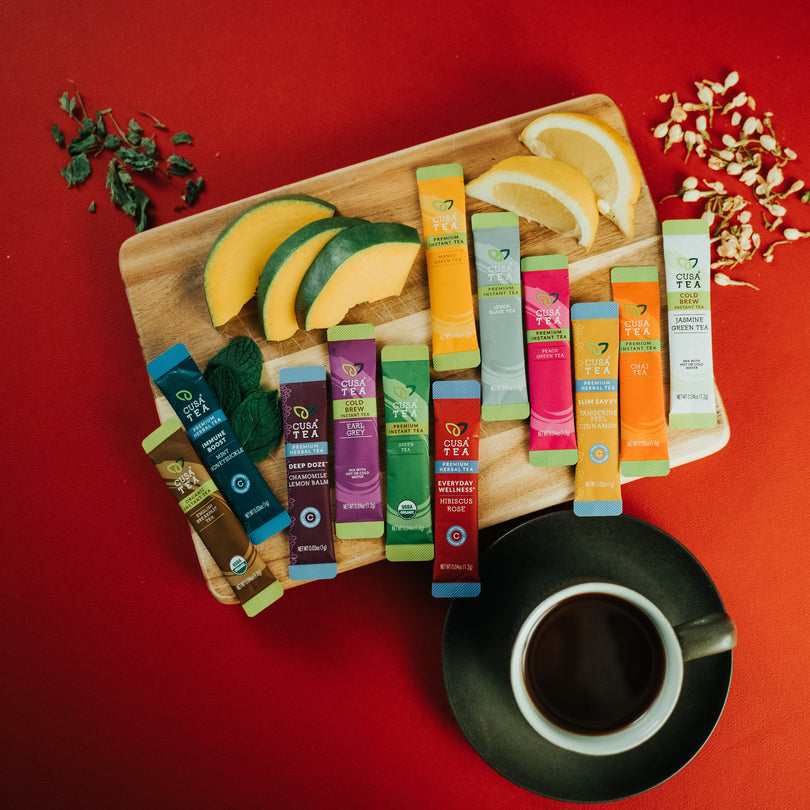
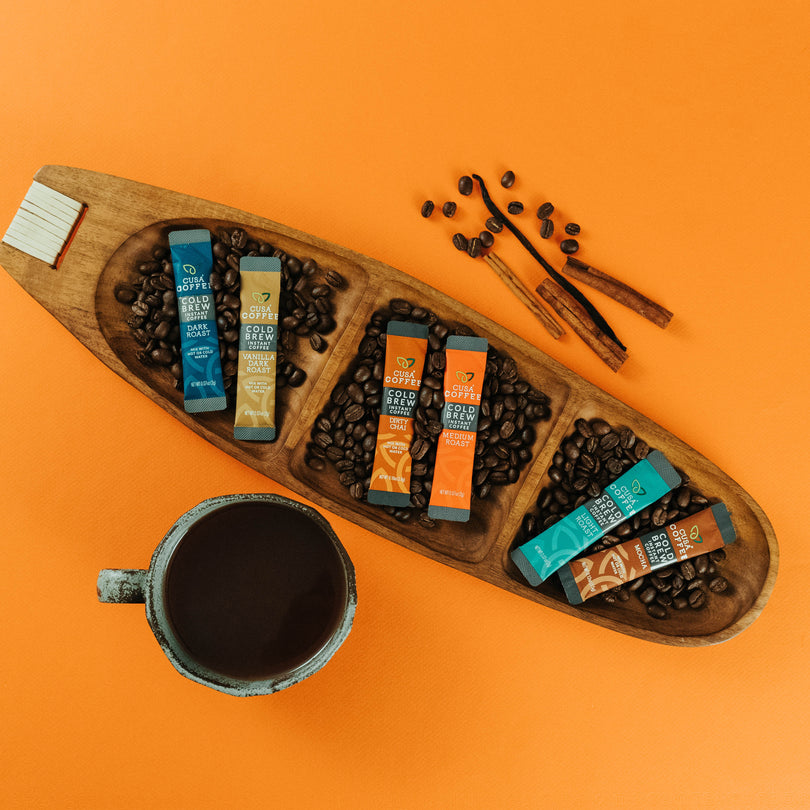
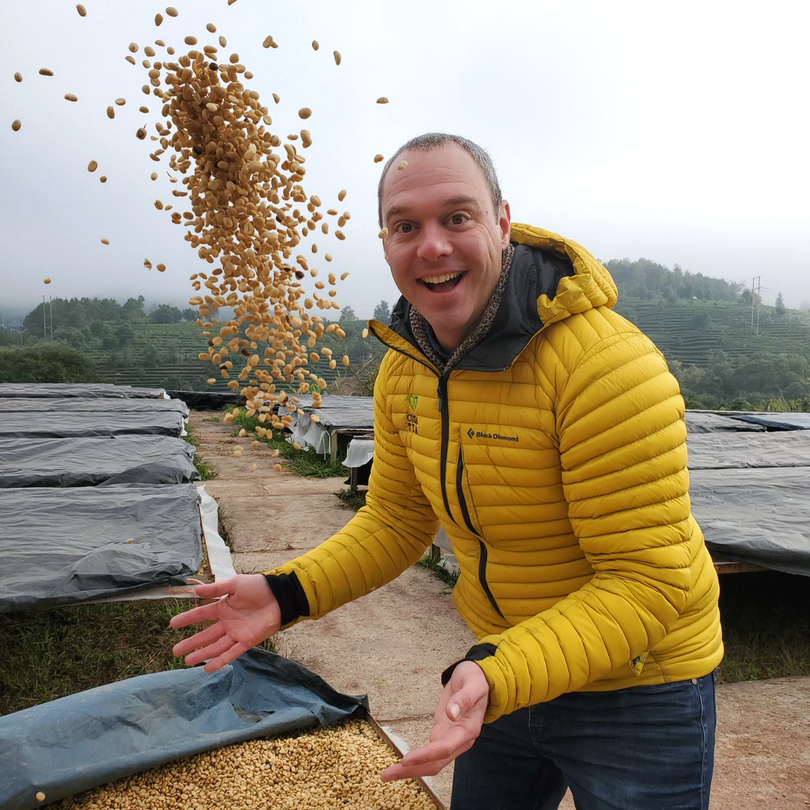
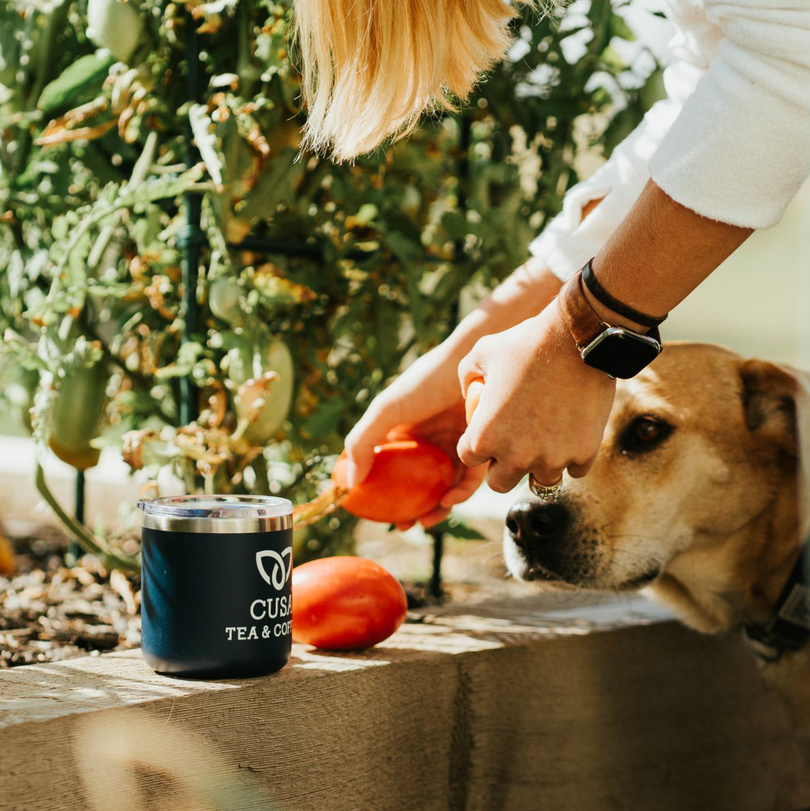
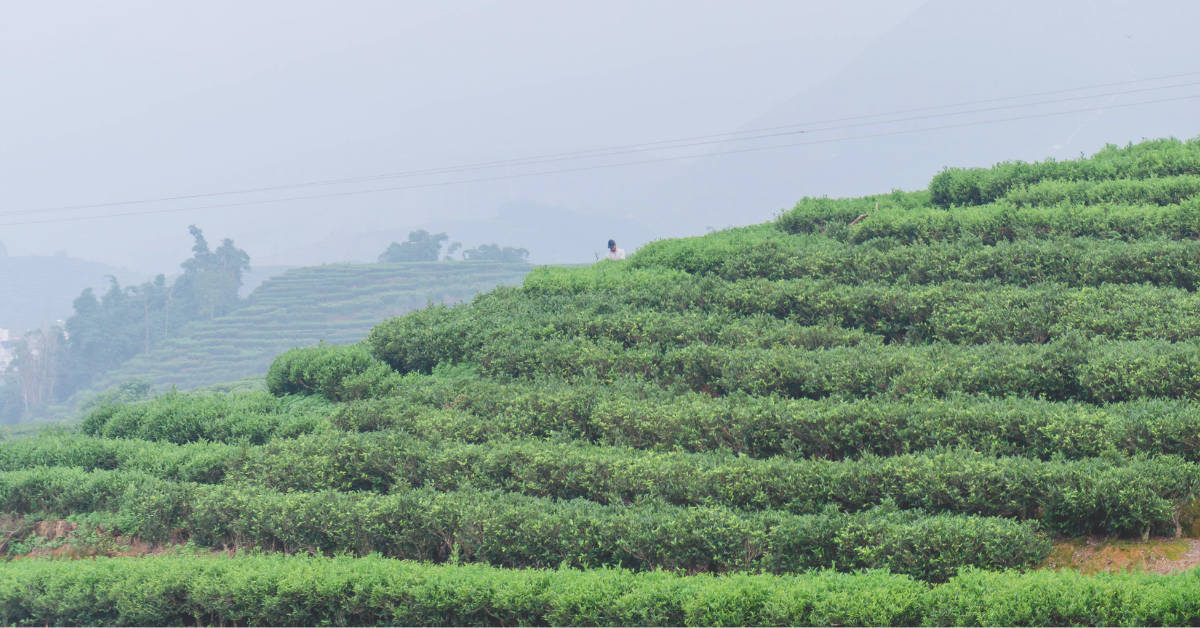

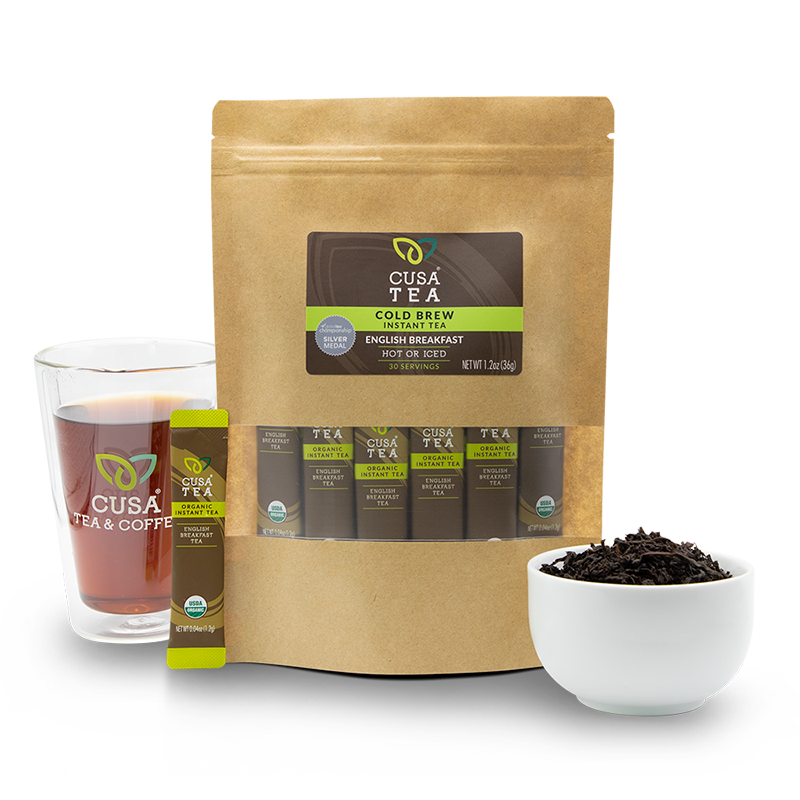
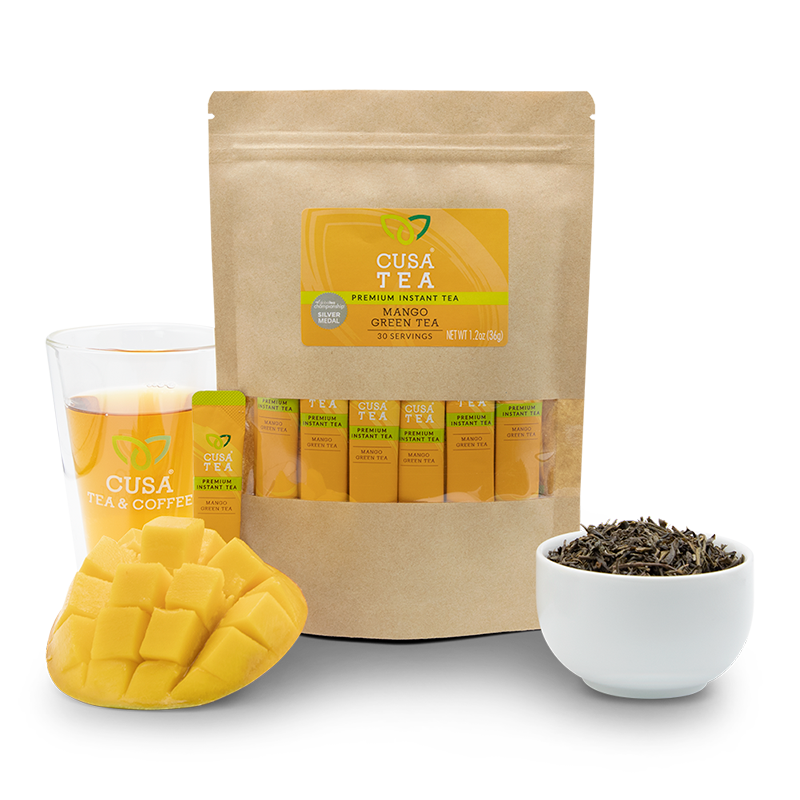
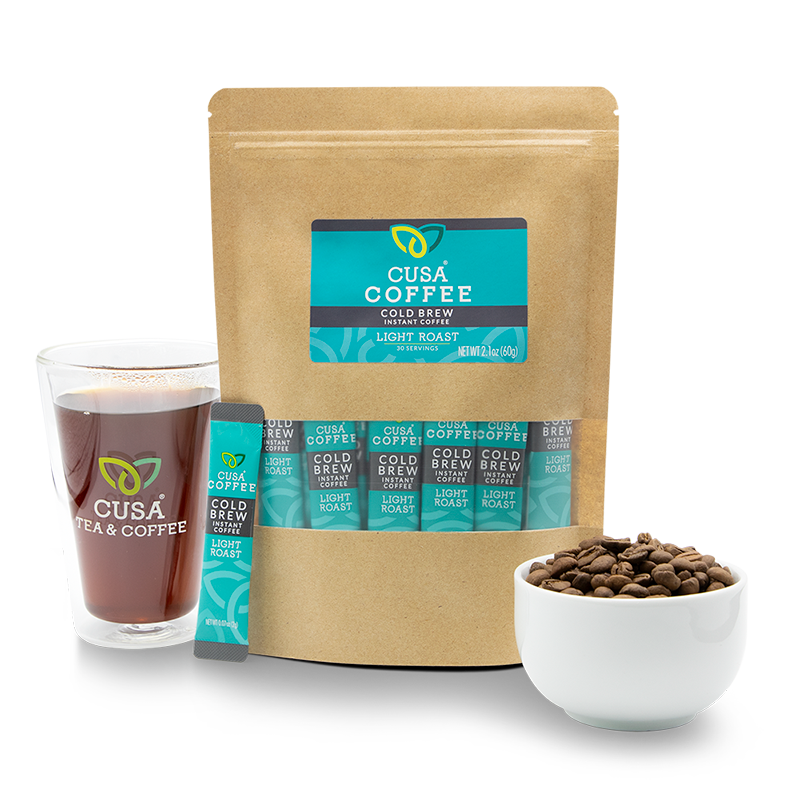
1 comment
KD
Hello,
So many great reasons to love your wonderful company and products.
Thank you.
K.
🖤☕🖤☕🖤
Hello,
So many great reasons to love your wonderful company and products.
Thank you.
K.
🖤☕🖤☕🖤